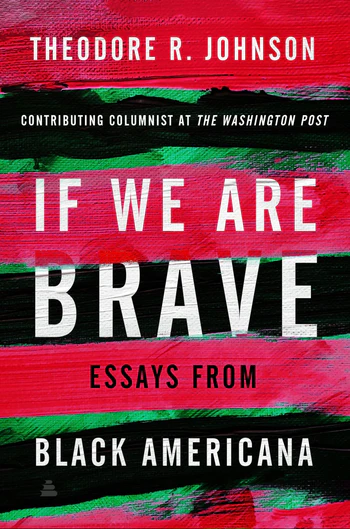If We Are Brave Essays from Black Americana
Theodore R. Johnson is the author of When the Stars Begin to Fall: Overcoming Racism and Renewing the Promise of America; a Senior Advisor at New America, leading its flagship Us@250 initiative marking the nation’s semi quincentennial; and a contributing columnist at the Washington Post. Prior to joining New America, he was a senior fellow and Director of the Fellows Program at the Brennan Center for Justice at the NYU School of Law, where he undertook research on race, politics, and American identity. He is a retired Commander in the United States Navy, serving for twenty years in a variety of positions, including as a White House Fellow in the first Obama administration and as speechwriter to the Chairman of the Joint Chiefs of Staff. His work on race relations has appeared in prominent national publications across the political spectrum, including the New York Times Magazine, the Atlantic, the Wall Street Journal, and National Review. Johnson is a proud HBCU graduate, holding a BS in mathematics from Hampton University as well as an ALM with a concentration in international relations from Harvard University and a doctorate of law and policy from Northeastern University. ... Read more Read less
The popular Washington Post contributing opinion columnist challenges readers to have uncomfortable conversations about race, drawing on the first-person perspectives of the author and Americans from diverse viewpoints and walks of life.
“The United States claims to be a nation founded on an idea,” writes Theodore R. Johnson, “but Americans—even though we nod our heads to that assertion—do not agree on what that idea is, what it should do, or who it is for.” The reality is that America is facing an existential quandary. Its citizens do not share a common vision for a democratic system in action, and even worse, do not share a common vision for what the country should be. We use the same words, but do not speak the same language.
If We Are Brave is a keen-eyed and sobering examination of this rift and how race exposes and challenges traditional conceptions of national identity, national mythology, and American democracy. It is both a cultural exploration and a consideration of the American experiment through the eyes and experiences of Americans of different generations that cuts across race, ethnicity, gender, region, religion, and class. Johnson reveals the subtle ways that racialized conceptions of the American identity and the imperfect culture of democracy have hindered our ability to connect with one another, carefully piecing together first-person accounts ranging from a Rust Belt diner to the back of a police car to a jail cell.
A beautiful but harsh indictment of a nation that aspires to be a more perfect union yet has consistently and painfully fallen short, If We Were Brave is a portrait of a nation at the precipice. It is an eye-opening, essential resource in a pivotal election year which will define America’s future, and a much-needed beacon of truth that sheds a bright light on who we are.
... Read more Read less










